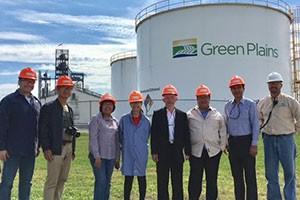The U.S. Grains Council (USGC) recently hosted a team of automobile manufacturers, ethanol policy regulators, fuel distributors, and ethanol producers from Southeast Asia to engage in a fact finding mission about higher blends of ethanol in the gasoline pool.
As Thailand has already gone to a nationwide ethanol blending program, with almost 50 percent of retail outlets offering E20, Thai automobile producers were central to the team’s work and able to share their experiences and successes with higher blend rates with colleagues from other countries.
Currently, the Philippines has a proposal in place by the Department of Energy to increase ethanol blends to E20 by 2020, but serious concerns exist and pre-determined implementations need to begin in order for that to happen. This team was designed to bring all interested parties under one roof and have them share their concerns with their counterparts and experts from the Untied States.
In Washington D.C., participants engaged in meetings with both government agencies and trade associations, with a particular focus on the health and environmental benefits of ethanol including information from the U.S. Environmental Protection Agency (EPA).
“So often ethanol blending programs throughout the world are focused solely on the development of rural agriculture. While that piece of puzzle is obviously important, there are other factors like the environment and engine performance, to consider as well,” said Kevin Roepke, regional director for South and Southeast Asia and an escort for the group.
“By getting this group of professionals together and focused on the promotion of ethanol for one week, they came away with many important realizations about the multitude of benefits from ethanol blending.”
To facilitate these goals, the team also visited Detroit to meet with automotive engineering experts who presented information on the optimization of engine performance using higher octane fuels with downsized, higher compression engines. The team also met with pump distributors to get a sense of what it would take to outfit gasoline pumps and underground storage tanks suitable for gasoline with a higher content of alcohol.
“For many of the participants, they had no idea engines can run more efficiently on higher blends of ethanol,” Roepke said. “At the end of the day, the world will be short octane and long carbon, and that’s a favorable niche for a product like ethanol to be in.”
The itinerary concluded in Sacramento, where the team got a crash course in the low carbon fuel standard (LCFS), implemented by the California Air Resources Board (CARB). They were met by representatives of the agency, as they explained their goals of moving to a zero emissions fleet, but also recognized the importance that low carbon fuels like ethanol can play in lowering greenhouse gases and enabling automobile manufacturers to comply with corporate average fuel economy (CAFE) standards by using high octane gasoline.
“This was really a fascinating exercise to witness people from many different industries, with different objectives, all coalesce over a common issue—ethanol. A diverse team like this is tremendously useful going forward,” he said.
The Council and its ethanol market development partners, the Renewable Fuel Association (RFA), Growth Energy and USDA’s Foreign Agricultural Service (FAS), will continue working to assist these Southeast Asian customers and others from around the world in becoming more comfortable with higher blend mandates for ethanol, ultimately leading to purchases of U.S. ethanol in the future.
Click here to read past articles about the Council’s ethanol market development in Southeast Asia.


